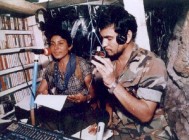Today, hundreds of thousands of people across the globe are coming together to challenge the status quo. While social movements haven’t received this much airtime in a while, mainstream media continues to portray progressive movements like the Arab Spring, the Wisconsin labor movement, and Occupy using the same old rightwing frames that seek to discredit the possibilities of real change. Some of the words and images corporate media have used to describe demonstrations and actions this week and last are “anger,” “gloom,” burning flag,” (Associated Press), “mischief-makers” (Forbes), “besiege,” and “season of acrimony” (Wall Street Journal).
Occupation/decolonization, home takeovers and other direct action—like the powerful 99% Spring takeover of the Wells Fargo shareholders meeting in San Francisco last week—are just some of the important tactics being used by activists and organizers. Culture jamming—the disruption or subversion of mainstream institutions via culture and communications, i.e. appropriating the branding of corporate banking institutions—is another tactic that has been getting the attention of the ruling class.
Last month, the culture jamming activist duo the Yes Men successfully launched a corporate hoax on Bank of America, sending out a mass email announcing a “Your Bank of America” campaign in which customers were invited to shape the future of the bank. Culture jamming often incorporates humor and satire—effective vehicles for messages for social justice—as in the case of YourBofA.com. Mainstream media will still do its best to deride or completely ignore culture jamming tactics (there was only one mainstream media hit about the hoax), but the use of humor and satire can make culture jamming an effective vehicle for social justice messages.
future of the bank. Culture jamming often incorporates humor and satire—effective vehicles for messages for social justice—as in the case of YourBofA.com. Mainstream media will still do its best to deride or completely ignore culture jamming tactics (there was only one mainstream media hit about the hoax), but the use of humor and satire can make culture jamming an effective vehicle for social justice messages.
The hoax email read: “We may not have all the answers, but we’re confident that those answers exist,” said Brian Moynihan, Chief Executive Officer of Bank of America. “We want to make sure the American people are well positioned to assert control and implement changes in the direction of banking, in the eventuality that such control becomes feasible.”
The hoax got the attention of the Bank of America and Google, which initially disrupted the site’s availability. The Yes Men—who described themselves as facilitating a project of Occupy Wall Street—clarified that http://yourbofa.com/ was not a phishing site. And, Bank of America emailed a press release to its customers headed by the statement: “The malicious website (YourBofA.com) that is fraudulently representing itself as a Bank of America re-branding effort is misleading the public; those behind it will be prosecuted to the fullest extent the law allows.”
Ironically, this was great public relations for YourBofA.com. Not only was the URL for the excellently designed site shared, but the press release read: “Banking is too complicated for ordinary people to understand,” said Jeff Walburn, Risk Management, Bank of America. He follows with another patronizing comment, but basically asserts the underpinning message of YourBofA.com—regular folks should have a say in how major banking institutions do business, e.g. with our bailout tax dollars.
*Editor’s note – on May 1st the site YourBofA.com page was taken down.
Subverting culture and disrupting big business are incredible feats in this day and age. With massive conglomeration and globalization being the norm for multinational corporations (including media, telecommunications, and financial institutions), the consequences can be high. It’s a price that movers and shakers have paid for generations and one that is very much alive in the collective memory of those from the global south.
 The term “culture jamming” is derived from radio jamming. One famous example of the power of disrupting and seizing communication for the people is Radio Venceremos of El Salvador—the clandestine radio broadcast that denounced the atrocities committed by the United States-backed Salvadoran military dictatorship. The 40-year old radio transmitter and the voice of Radio Venceremos, Carlos Henriquez Consalvi, aka “Santiago,” had evaded military capture for years, but the military’s hunt for the transmitter and the guerilla command post was the impetus for the heinous El Mozote massacre of up to 1,000 villagers.
The term “culture jamming” is derived from radio jamming. One famous example of the power of disrupting and seizing communication for the people is Radio Venceremos of El Salvador—the clandestine radio broadcast that denounced the atrocities committed by the United States-backed Salvadoran military dictatorship. The 40-year old radio transmitter and the voice of Radio Venceremos, Carlos Henriquez Consalvi, aka “Santiago,” had evaded military capture for years, but the military’s hunt for the transmitter and the guerilla command post was the impetus for the heinous El Mozote massacre of up to 1,000 villagers.
The struggle to protect the right to communicate is fundamental to all human rights. Creating our own media, and ensuring media access and media conditions that elevate and protect the humanity of all our communities, is a viable platform to advance racial and economic justice. Check out the Media Action Grassroots Network and consider applying for your own community radio station, because the right to communicate should belong to everyone.




